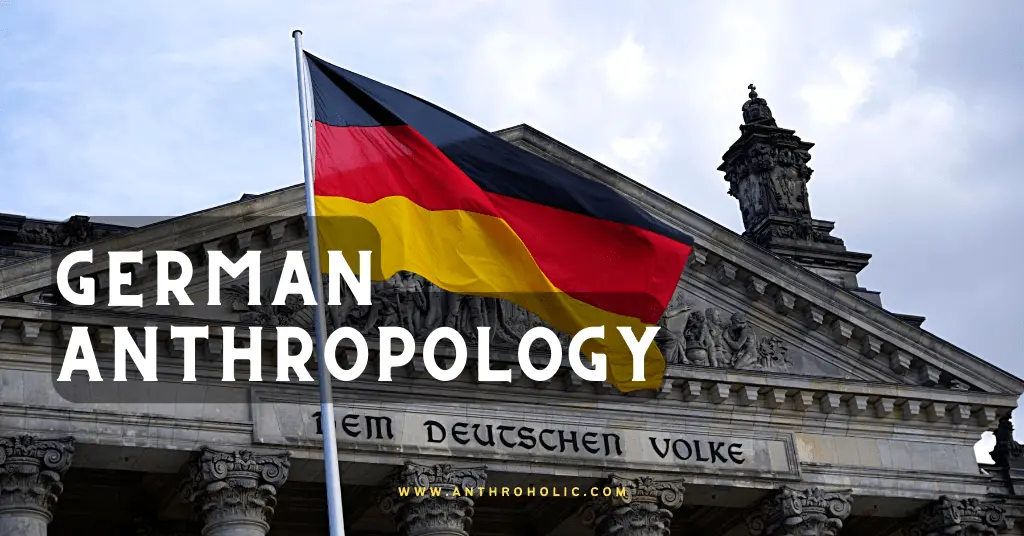AI Answer Evaluation Platform Live Now. Try Free Answer Evaluation Now
German Anthropology
German anthropology traces its roots to the Enlightenment period, during which European scholars began to systematically study human societies and cultures. Early German anthropologists were influenced by philosophers such as Immanuel Kant and Johann Gottfried Herder, who emphasized the importance of understanding cultural diversity and the historical context of human societies (Köpping, 2005).

Historical Development of German Anthropology
The late 19th and early 20th centuries marked a period of rapid growth and innovation in German anthropology. Key figures such as Franz Boas, Adolf Bastian, and Leo Frobenius laid the groundwork for modern anthropological methods and theories (Köpping, 2005). This period also saw an increase in ethnographic fieldwork and the establishment of anthropological institutions, such as the Berlin Ethnological Museum.
Post-World War II Developments: After World War II, German anthropology experienced a period of introspection and reorientation. The discipline moved away from its earlier emphasis on race and physical anthropology, focusing instead on the study of culture, social structures, and human behavior (Hartmann, 2007).
Key Contributions of German Anthropology
- Cultural Relativism: German anthropologists, particularly Franz Boas, played a significant role in the development of cultural relativism, which posits that cultural practices and beliefs should be understood within their specific historical and social contexts (Boas, 1887/1974). This approach has had a profound impact on the way anthropologists study human societies and has helped to dispel ethnocentric biases in research.
- Ethnography: Ethnographic fieldwork, a cornerstone of anthropological research, was also significantly influenced by German anthropologists. Adolf Bastian and Leo Frobenius, for example, emphasized the importance of immersive, long-term fieldwork for understanding cultural practices and beliefs (Köpping, 2005).
- Anthropological Theory: German anthropologists have contributed to the development of numerous anthropological theories, including structuralism, diffusionism, and historical particularism (Hartmann, 2007). These theoretical approaches have shaped the way anthropologists study and understand human societies and cultures.
Subfields within German Anthropology
German anthropology encompasses a wide range of subfields, including:
- Social and Cultural Anthropology: This subfield focuses on the study of human societies and cultures, examining aspects such as kinship, politics, religion, and economics. Key German anthropologists in this area include Franz Boas, Adolf Bastian, and Leo Frobenius.
- Physical Anthropology: Physical anthropology, also known as biological anthropology, studies the biological and physiological aspects of human beings. Early German anthropologists, such as Johann Friedrich Blumenbach and Rudolf Virchow, made significant contributions to this subfield (Hartmann, 2007).
- Linguistic Anthropology: Linguistic anthropology explores the relationship between language and culture, as well as the structure and evolution of languages. German anthropologist Wilhelm von Humboldt was an early pioneer in this field, with his work on linguistic relativity and the classification of languages (Humboldt, 1836/1999).
- Archaeology: German archaeologists have made significant contributions to the understanding of human history and prehistory. Heinrich Schliemann’s excavations at Troy and Mycenae, for example, helped to confirm the historical basis for the ancient Greek epics (Easton, 1998).
The Impact of German Anthropology on Global Research
German anthropology has had a profound impact on the broader field of anthropology, influencing research methods, theories, and approaches in various ways:
- Methodological Innovations: German anthropologists were instrumental in establishing ethnographic fieldwork as a central method in anthropological research. Their emphasis on immersive, long-term fieldwork has been widely adopted by anthropologists worldwide (Köpping, 2005).
- Theoretical Contributions: German anthropological theories, such as cultural relativism and historical particularism, have had a lasting impact on the way anthropologists approach the study of human societies and cultures (Hartmann, 2007).
- Interdisciplinary Influence: German anthropology has also influenced other disciplines, such as sociology, psychology, and history, by providing valuable insights into human behavior, culture, and social organization.
Leading German Anthropologists
| Anthropologist | Contributions |
|---|---|
| Franz Boas | Cultural relativism, ethnographic fieldwork, historical particularism |
| Adolf Bastian | Ethnography, the concept of “elementary ideas” |
| Leo Frobenius | Ethnography, cultural history, diffusionism |
| Johann Friedrich | Blumenbach, physical anthropology, the classification of human races |
| Rudolf Virchow | Physical anthropology, the “biocultural approach” |
| Wilhelm von Humboldt | Linguistic anthropology, linguistic relativity, language classification |
| Heinrich Schliemann | Archaeology, excavations at Troy and Mycenae |
Conclusion
German anthropology has a rich history and has made significant contributions to the broader field of anthropology. From its early beginnings during the Enlightenment to its current focus on culture, social structures, and human behavior, German anthropology has continually evolved and adapted to new challenges and perspectives. The contributions of key German anthropologists, such as Franz Boas, Adolf Bastian, and Leo Frobenius, have had a lasting impact on anthropological research and theory worldwide.
See Also
References
- Boas, F. (1974). The Central Eskimo (originally published 1887). Lincoln: University of Nebraska Press.
- Easton, D. F. (1998). Heinrich Schliemann: Hero or fraud? The Classical World, 91(5), 335-343.
- Hartmann, M. (2007). The history of German anthropology after 1945. In H. G. Nutini & B. R. Ortiz de Montellano (Eds.), Recovering the Past: The Search for the New German Anthropology (pp. 3-19). University of Pittsburgh Press.
- Humboldt, W. von. (1999). On language: On the diversity of human language construction and its influence on the mental development of the human species (originally published 1836). Cambridge: Cambridge University Press.
- Köpping, K.-P. (2005). Adolf Bastian and the psychic unity of mankind: The foundations of anthropology in nineteenth century Germany. Münster: LIT Verlag.



